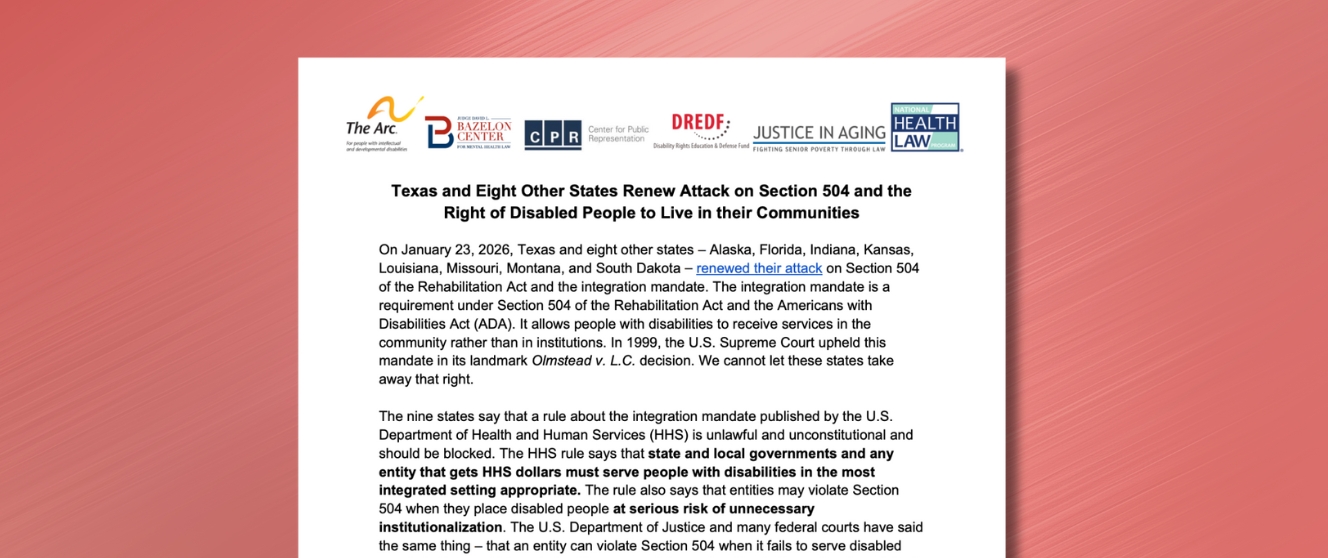
Transgender people with disabilities are an integral part of the disability community. Trans people are more likely to have a disability than cisgender people: For example, the 2015 U.S. Transgender Survey found that 39% of respondents reported a disability, as compared to 15% of the general U.S. population.[1] Like all disabled people, trans disabled people deserve the right to bodily autonomy, self-determination, and equitable access to health care, including gender-affirming care. However, in recent years, anti-trans lawmakers have escalated their attacks on transgender people’s access to health care, with many explicitly targeting disabled transgender people and using ableist rhetoric to justify restrictions on gender-affirming care. These attacks threaten the dignity of transgender people with disabilities—and the rights of all disabled people.
Attacks On Access to Gender-Affirming Care Have Proliferated Nationwide.
Gender-affirming care is best practice care that is medically necessary for the wellbeing of many transgender people. This often life-saving care is individualized, age-appropriate, and provided according to well-established standards of care. Every major medical organization in the United States—representing over 1.3 million doctors—calls for access to gender-affirming care for transgender people.[2] Numerous studies document the benefits of gender-affirming care, including increased quality of life and wellbeing, decreased depression and anxiety, and decreased suicidality.[3]
Despite the well-established benefits of gender-affirming care, extremists across the country have advanced laws and policies aimed at banning gender-affirming care. Since 2022, hundreds of bills attacking health care for transgender people have been introduced in legislatures across the country,[4] and 26 states have passed such bills into law.[5] On the federal level, the Trump Administration has launched an unprecedented attack on transgender people’s access to care,[6] while numerous bills targeting this care have been introduced in Congress.[7] And in September 2024, Attorneys General in 17 states filed a lawsuit to prevent transgender people experiencing gender dysphoria from receiving protection under Section 504, while simultaneously asking the court to declare Section 504 itself unconstitutional and challenging the right of people with disabilities to receive services in integrated settings.[8]
Ableist Justifications for Limiting Access to Gender-Affirming Care Are Deplorable.
Many proponents of gender-affirming care bans have singled out transgender people with disabilities in both their policies and their rhetoric. For example, policymakers have tried to justify restrictions on gender-affirming care by pointing to the higher prevalence of disabilities among transgender people, suggesting that the presence of a disability should call into question transgender people’s capacity to make decisions about their care. There are a range of factors that contribute to the higher rates of disability among transgender people—but contrary to the claims of anti-trans policymakers, having a disability can never justify being denied basic rights and access to care. As disability advocacy organizations, we know that all disabled people, including those who are transgender, can and should make decisions about their bodies and health care.
Proponents of anti-trans policies have shown flagrant disregard for this principle, repeatedly targeting disabled transgender people. For example, some proposals have sought to impose heightened restrictions on access to gender-affirming care for disabled people. Many state lawmakers have introduced or passed bills in recent years that explicitly use disability to justify their restriction of gender-affirming care. Several states have enacted laws banning care for trans youth that include findings that trans people are more likely to have psychiatric or developmental disabilities and suggesting that they should face additional hurdles to the care they need.[9] Some states have also passed laws that make it easier to sue providers of gender-affirming care for malpractice if their patient has a mental health disability.[10]
This trend of ableist justifications for anti-trans discrimination has also made its way to the courts. Recently, plaintiffs represented by a single law firm have filed lawsuits across the country accusing doctors, nurses, and health care clinic staff of fraud and malpractice for providing gender-affirming care to people with disabilities. These cases also accuse therapists of malpractice for not using a patient’s disability as a basis for dismissing their gender identity or discouraging them from seeking gender-affirming care.
In addition, lawsuits seeking to punish health care professionals for offering gender-affirming care to trans patients with disabilities or to punish mental health professionals for affirming a trans disabled patient’s identity are extremely dangerous: they threaten providers with lawsuits and a loss of their license for the provision of medically necessary health care. A rise in medical malpractice lawsuits could create a chilling effect or even discourage providers from providing gender-affirming care to trans patients with disabilities altogether, especially to people with mental health, intellectual, developmental, or cognitive disabilities.
These discriminatory bills and lawsuits weaponize ableism to justify anti-trans policies and seek to strip trans people with disabilities of autonomy over their own bodies and decision-making. Proponents of these policies falsely claim that people with disabilities lack the mental capacity to recognize and assert their gender identity. These claims—and the assumptions they betray about disabled people’s dignity and humanity—are an affront not only to trans disabled people, but to the entire disability community.
Transgender People with Disabilities Must Have the Freedom to Make Self-Determined Decisions About Their Health Care For Disability Justice to Be Achieved.
People with disabilities are no strangers to baseless and harmful judgments about their capacity to make self-determined decisions. In the United States, disabled people have been systematically denied the right to make decisions about their bodies, lives, and futures because of state-sanctioned forced sterilization, limits on marriage, restrictive guardianships, “ugly laws,” forced institutionalization, and paternalistic attitudes. Attempts to ban or restrict access to gender-affirming care because of a patient’s disability are yet another attack on disabled people’s autonomy and self-determination. They are both dangerous and deplorable.
Assumptions that disabled trans people—including those with mental health, intellectual, and developmental disabilities—cannot make decisions about their health care is discrimination based on disability. This type of discrimination can be a violation of the Americans with Disabilities Act, Section 1557 of the Affordable Care Act, and Section 504 of the Rehabilitation Act.
Disabled people should be presumed to have the capacity to make healthcare decisions, including the decision to access gender-affirming care. Healthcare providers can and should ensure that disabled people get meaningful access to gender-affirming care and offer appropriate support for patients with intellectual, developmental, and mental health disabilities when needed. This support may include reasonable accommodations like effective communication measures or supported decision-making,[11] as well as providing the disabled individual with the necessary information in an accessible format and giving them additional time to make a decision.[12] These best practices stand in stark contrast to the anti-trans claim that providers should question a person’s gender identity or even deny them gender-affirming care on the basis of their mental health, intellectual, or developmental disabilities.
Disability justice principles remind us that cross-movement solidarity and collective liberation are the only ways to achieve our shared aims. As disability rights and justice advocates and organizations, we urge policymakers at all levels to reject anti-trans policies and rhetoric and, instead, enact comprehensive measures that ban discrimination and promote equality, nondiscrimination, and accessibility for all. As disability advocacy organizations, we call for policies that embrace disabled trans people, respect their self-determination, and celebrate their power.
Access Ready, Inc.
American Association of People with Disabilities
Autistic Self Advocacy Network
Autistic People of Color Fund
Autistic Women & Nonbinary Network
Bazelon Center for Mental Health Law
CommunicationFIRST
CUNY School of Law
Detroit Disability Power
Disability Rights California
Disability Rights Education & Defense Fund
Family Voices NJ
Justice in Aging
National Association for Rights Protection and Advocacy
National Disabled Legal Professionals Association
National Partnership for Women & Families
National Women’s Law Center
Network of Women with Disabilities NOW
Northern Justice Project, LLC
Positive Women’s Network-USA
TakeRoot Justice
US Gender and Disability Justice Alliance
Women Enabled International
[1] Sandy E. James et al., The Report of the 2015 U.S. Transgender Survey 57 (Dec. 2016), https://transequality.org/sites/default/files/docs/usts/USTS-Full-Report-Dec17.pdf. See also Abigail Mulcahy et al., Gender Identity, Disability, and Unmet Healthcare Needs Among Disabled People Living in the Community in the United States, 19 International Journal of Environmental Research and Public Health 2588 (Feb. 23, 2022), doi.org/10.3390/ijerph19052588.
[2] Advocates for Trans Equality, Trans Health Project: Medical Organization Statements (last accessed Feb. 24, 2025), https://transhealthproject.org/resources/medical-organization-statements.
[3] See, e.g, Kellan E. Baker, et al., Hormone Therapy, Mental Health, and Quality of Life Among Transgender People, 5 J. of the Endocrine Society 4-12 (2021) (collecting studies) https://academic.oup.com/jes/article/5/4/bvab011/6126016?login=false; see also Zoe Aldridge et al., Long Term Effect of Gender Affirming Hormone Treatment on Depression and Anxiety Symptoms in Transgender People: A Prospective Cohort Study, 9 Andrology 1812 (Nov. 2021), https://pubmed.ncbi.nlm.nih.gov/32777129; Diana M. Tordoff, et al., Mental Health Outcomes in Transgender and Nonbinary Youths Receiving Gender Affirming Care, 5 JAMA Network Open e220978 (Feb. 25, 2022) https://jamanetwork.com/journals/jamanetworkopen/fullarticle/2789423.
[4] Tracking the Rise of Anti-Trans Bills in the U.S., Trans Legislation Tracker, https://translegislation.com/learn (last accessed Feb. 24, 2025).
[5] Human Rights Campaign, Map: Attacks on Gender Affirming Care by State (last accessed Feb. 24, 2025), https://www.hrc.org/resources/attacks-on-gender-affirming-care-by-state-map.
[6] See, e.g., Exec. Order No. 14187, 90 Fed. Reg. 8771 (Feb. 3, 2025).
[7] E.g., H.R.498, 119th Cong. (2025), https://www.congress.gov/bill/119th-congress/house-bill/498/text/ih; S.2357, 118th Cong. (2023), https://www.congress.gov/bill/118th-congress/senate-bill/2357/text; H.R.1399, 118th Cong. (2023), https://www.congress.gov/bill/118th-congress/house-bill/1399/text; H.R.5009, 118th Cong. (2024), https://www.congress.gov/bill/118th-congress/house-bill/5009/text (enacted into law as P.L. 118-159).
[8] Complaint, Texas v. Becerra, 5:24-cv-00225 (N.D. Tex., 2024), https://www.texasattorneygeneral.gov/sites/default/files/images/press/HHS%20Rehabilitation%20Act%20Complaint%20Filestamped.pdf.
[9] See, e.g., Ohio HB 68, sec. 2(D) (2023), https://legiscan.com/OH/text/HB68/id/2863440; Arkansas 1570, sec. 2(4) (2021), https://www.arkleg.state.ar.us/Home/FTPDocument?path=%2FACTS%2F2021R%2FPublic%2FACT626.pdf; see also GA SB141, sec. 1(4) (2023), https://legiscan.com/GA/text/SB141/id/2692266.
[10] See, e.g., Ark. Code § 16-114-403.
[11] Nicole Agaronnik, et al., Communicating with Patients with Disability: Perspectives of Practicing Physicians, 34(7) J. Gen. Intern. Med. 1139 (Jul 2019); Support Without Courts, https://supportwithoutcourts.org/; American Civil Liberties Union, Supported Decision-Making Resource Library, https://www.aclu.org/documents/supported-decision-making-resource-library.
[12] See American Civil Liberties Union, Supported Decision-Making: Frequently Asked Questions (Apr. 11, 2016), https://www.aclu.org/documents/faqs-about-supporteddecision-making.


